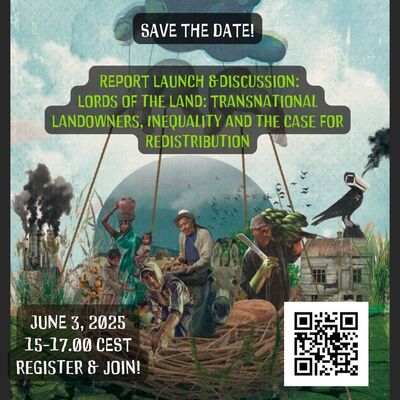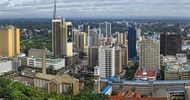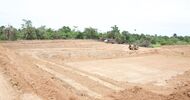While the COVID-19 pandemic threatens the health of Indigenous peoples in Brazil’s Amazon, pressure over their traditional lands is increasing as grileiros –individuals who illegally seize land – sense an opportunity to exploit the crisis.
RSPO member companies and their associates account for three-quarters of the fire hotspots detected in the plantation concessions of the top 30 groups in the first nine months of 2019.
- Greenpeace
-
09 November 2019
Agribusiness—especially soy, sugar, palm oil, and beef production—was the second deadliest sector for people standing up for the environment and their lands.
- Civil Eats
-
02 August 2019
ESCR-Net has written to President Bio about the human rights violations against members of the Malen Affected Landowners and Users Association in connection with industrial scale palm oil operations by Société Financière des caoutchoucs (Socfin Group).
Okomu's Managing Director surprised about attacks directed at the company over its RSPO certification, saying it would be the first palm oil company in Nigeria to be so certified by October this year.
- Nigerian Observer
-
26 June 2018
The report titled, Unmasking land grabbing in Ghana: restoring livelihoods; paving way for the Sustainable Development Goals (SDGs), narrates how land grabbing is affecting rural livelihoods and threatening food security the country in the long run.
- Vatican Radio
-
29 August 2016
English translation of the joint request by 6 Japanese NGOs to the Minister of Foreign Affairs, Japan, and the President of JICA
As the land and resource grabbers remain determined to take away what rightfully belongs to the people, we must be more resolute than ever in our struggle to defend land, resources and human rights. A join statement by landless peasant, farm workers, indigenous community and civil society organisation.
Where the culprits were largely governments and authoritative bodies, now multinational governments are working with these entities to take lands and deprive local communities of critical resources.
Now the government of President Santos seems to be pressing for reforms to the law that would enable further concentration of land in Colombia, even though this would be incoherent with the government’s own commitments to date in the peace talks.
Demand for the lucrative oil is increasing and land in the main exporting countries of Malaysia and Indonesia is quickly running out, so companies are now looking to the hot, humid countries along the Equator in West Africa.
Africa is regarded as the New Eldorado, and is attracting many foreign based private or public investment companies, sovereign wealth funds and even pension funds gradually. Sadly, while foreigners continue to play a major role in growth investments, African pension funds' contributions to this growth are dismal.
- Huffington Post
-
17 November 2012
No evidence to support the idea that “China” was intending to create an agricultural colony in Mozambique, or make the Zambezi Valley into China’s rice bowl.
- chinaafricarealstory.com
-
12 January 2012
Land has been the play-thing of centralising authoritarians throughout Ethiopia's recent history.
- openDemocracy
-
31 December 2011
For Gambellans who live as pastoralist and subsistence farmers, massive dispossession and auctioning off their land for pennies will inevitably destroy the very fabric of their society and way of life and threaten them with extinction.
Land is a powerful commodity that should be used for the betterment of humanity through farming and ecology.
While Brazil touts its efforts to slow destruction of the Amazon, another biodiverse region of the country is being cleared for large-scale farming. But unlike the heralded rainforest it borders, the loss of the cerrado and its rich tropical savanna so far has failed to attract much notice.
Nigeria's Heirs Holdings Ltd. completes investment in Mtanga Farms, a 2,200 ha farming operation at the heart of Tanzania's national initiative to combat food insecurity.
In Ethiopia, resentments over land grab have already started claiming lives. The TPLF regime has already killed 10 protesting ethnic Anuak farmers and has sent thousands more to concentration camps.
- Ethiomedia
-
04 January 2011
Not surprisingly, the backlash from people in Africa against Indian farmland investments has begun.
- Deccan Herald
-
27 November 2010
Saskatchewan has some of the richest and least expensive farmland in the world, and there's a gigantic pool of global money that would like to buy up as much of it as they can.
- Globe and Mail
-
24 November 2010
There are plenty of examples in the world of countries that can no longer feed themselves because somebody decided it was cheaper or more intelligent to buy all their food from somebody else.
- WorldWatch Institute
-
09 August 2010
"We support continued efforts to develop principles for investment in the agricultural sector undertaken by the World Bank, regional development banks, FAO, UNCTAD, and IFAD," say G8 heads of state.
- Canadian Press
-
26 June 2010
The Indonesian government is wise to learn from the South Korea Daewoo-Madagascar deal, which demonstrated the enormous economic, social and political risks associated with foreign ownership of land and water rights.
- CSR Asia
-
03 February 2010
A focus on agricultural productivity should not become a cover for foreign private companies to grab land or impose expensive, input-intensive methods in the name of modernisation.
As world population expands, the demand for arable land should soar. At least that's what George Soros, Lord Rothschild, and other investors believe.
Scotland’s richest man, an oil giant, an earl, and private equity and property firms are among those developing carbon credit projects that critics say are pushing up land prices and allowing companies to “greenwash” their image.
- The Ferrett
-
18 August 2022
Land grabbing is a direct acquisition of land shaped by failures of democracy, and economic governance.
- Standard Times
-
09 December 2015
Includes presentations on large-scale farmland investment in Sudan by public and private sector representatives.
Carbon credits and net-zero pledges are fuelling a new round of farmland buying by billionaires and pension funds that will undermine real climate action.
















